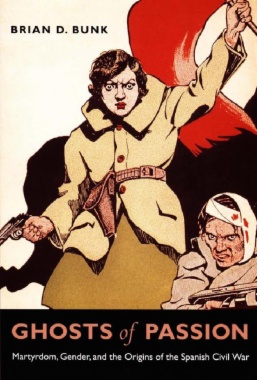The question of what caused the Spanish Civil War (1936–39) is the central focus of modern Spanish historiography. In
Ghosts of Passion, Brian D. Bunk argues that propaganda related to the revolution of October 1934 triggered the broader conflict by accentuating existing social tensions surrounding religion and gender. Through careful analysis of the images produced in books, newspapers, posters, rallies, and meetings, Bunk contends that Spain’s civil war was not inevitable. Commemorative imagery produced after October 1934 bridged the gap between rhetoric and action by dehumanizing opponents and encouraging violent action against them.
In commemorating the uprising, revolutionaries and conservatives used the same methods to promote radically different political agendas: they deployed religious imagery to characterize the political situation as a battle between good and evil, with the fate of the nation hanging in the balance, and exploited traditional gender stereotypes to portray themselves as the defenders of social order against chaos. The resulting atmosphere of polarization combined with increasing political violence to plunge the country into civil war.

